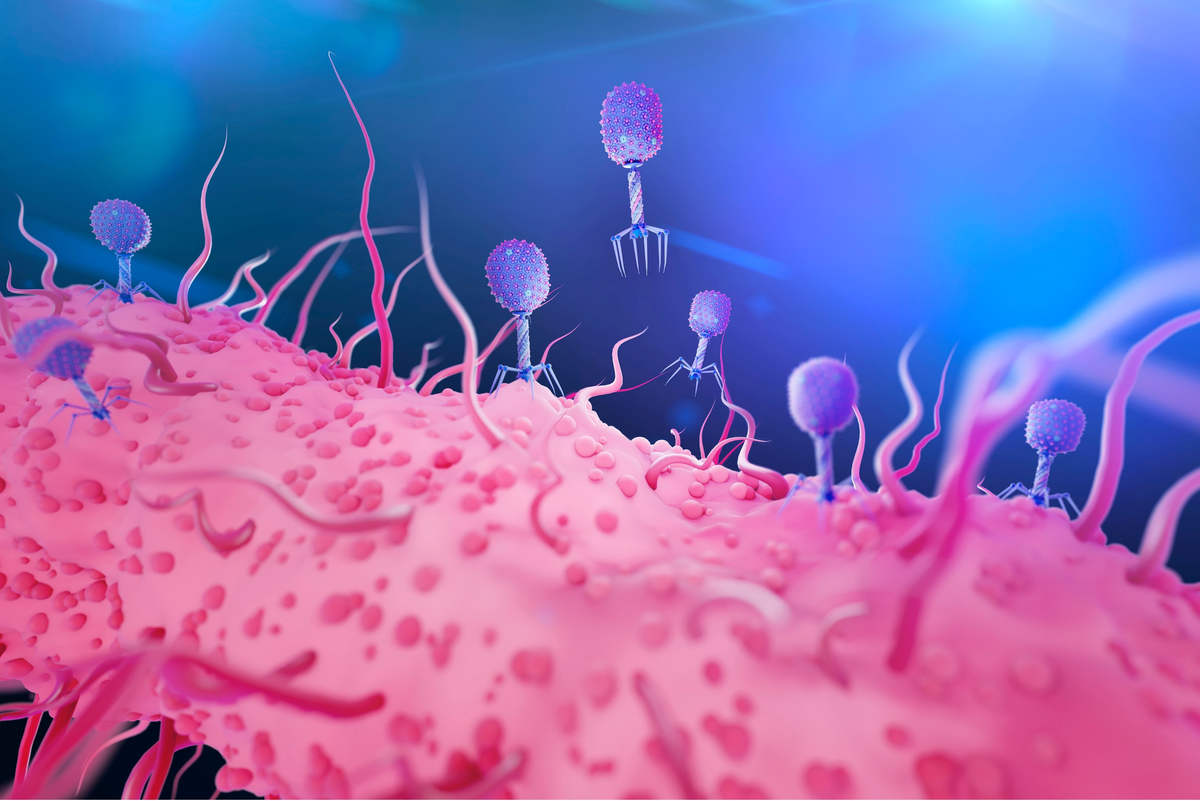Promise n° 1: a targeted treatment for persistent bacterial infections
Phage treatment involves using viruses that specifically target and kill bacteria to treat bacterial infections. The specificity and selectivity of phages enable them to target bacteria with great precision while sparing the rest of the human body.
However, an exceptional promise of phage therapy lies in its ability to treat persistent bacterial infections, such as when biofilms can be observed. Biofilms are structured aggregates of bacterial cells encased in a polymeric matrix that protect the bacteria, enabling them to survive in hostile environmental conditions. In such cases, the bacteria are more resistant to the host’s immune response and to antibiotics, thus resulting in a persistent infection. Bacteriophages could provide a solution in this case through their ability to produce certain enzymes capable of degrading the polysaccharides in the biofilm matrix and thus causing it to disperse. However, the fact that bacteriophages are specific to specific bacterial clades suggests that, to deal with biofilms formed by multi-species bacterial consortia, several bacteriophages will have to work together.
Promise n°2: a response to antibiotic resistance
Bacteria exposed to antibiotics evolve and develop defense mechanisms that enable them to evade their action. Once resistance has developed within these bacterial species, it can be transmitted to other species, contributing to the spread of the phenomenon, and rendering antibiotics ineffective. Multidrug-resistant infectious diseases have become a major global problem, both in terms of public health and the costs to healthcare systems. For example, in 2015, antibiotic resistance cost France alone 110 million euros, according to the Assurance Maladie (French Social Security Agency). Phage therapy, because it relies on different mechanisms of action from conventional antibiotics, may prove an effective alternative to the treatment of multi-resistant infections.
Find out how we can support you with your projects relating to antibiotic resistance >
Promise n°3: affordable and accessible treatment
Phage therapy can be an affordable treatment option for bacterial infections for several reasons:
- Natural phages are widely available as they are present in all environments where bacteria are found, including soil, plants, animals, lakes and oceans.
- The cost of producing phages is relatively low, as production essentially involves culturing the bacterial pathogen, bringing them into contact with multiplying phages, harvesting the phages, purifying them and administering them to the patient. This process proves to be much less expensive than the traditional production of antibiotics.
- The return on investment is better than for traditional antibiotics. Traditionally, it takes 10 years of R&D and several million euros to develop and market an antibiotic, which will only be truly effective for a few years due to the development of resistance to this antibiotic. In the case of phages, in the absence of resistance, the treatment’s time on the market can be much longer, and therefore the return on investment improved.
- Phages also have the potential to reduce treatment costs because phages exponentially grow and replicate. As a result, the in-situ densities achieved with these therapeutics allow lower starting doses of phage to be administered.
Promise n°4: potential beyond bacterial infections
Phage treatment could also be used for other therapeutic purposes. A growing body of research is revealing that phage therapy could be used to treat a wide range of conditions other than traditional bacterial infections. In particular, a study conducted at the University of California – San Diego showed that phage therapy could be used to treat chronic liver disease linked to alcohol consumption disorders. In these conditions, levels of a particular bacterium, Enterococcus faecalis, are correlated with disease severity and mortality in patients suffering from alcoholic hepatitis, and bacteriophages could be used to attack this very bacterium.
All in all, phage therapy holds a great deal of promise, especially against a backdrop of proliferating multi-resistant bacteria. However, it still faces major challenges, particularly in terms of regulation. Demonstrating the efficacy and safety of these treatments in controlled clinical trials is tricky for therapies that are as numerous as the bacterial infections we know. In other words, the specific nature of these therapies makes it difficult to generate general evidence, which means that their use is restricted to experimental purposes for the time being. Alcimed can help you with your phage therapy projects. Don’t hesitate to contact our team!
About the author,
Marie, Director of Alcimed’s Innovation and Public Policy Business Unit in France



